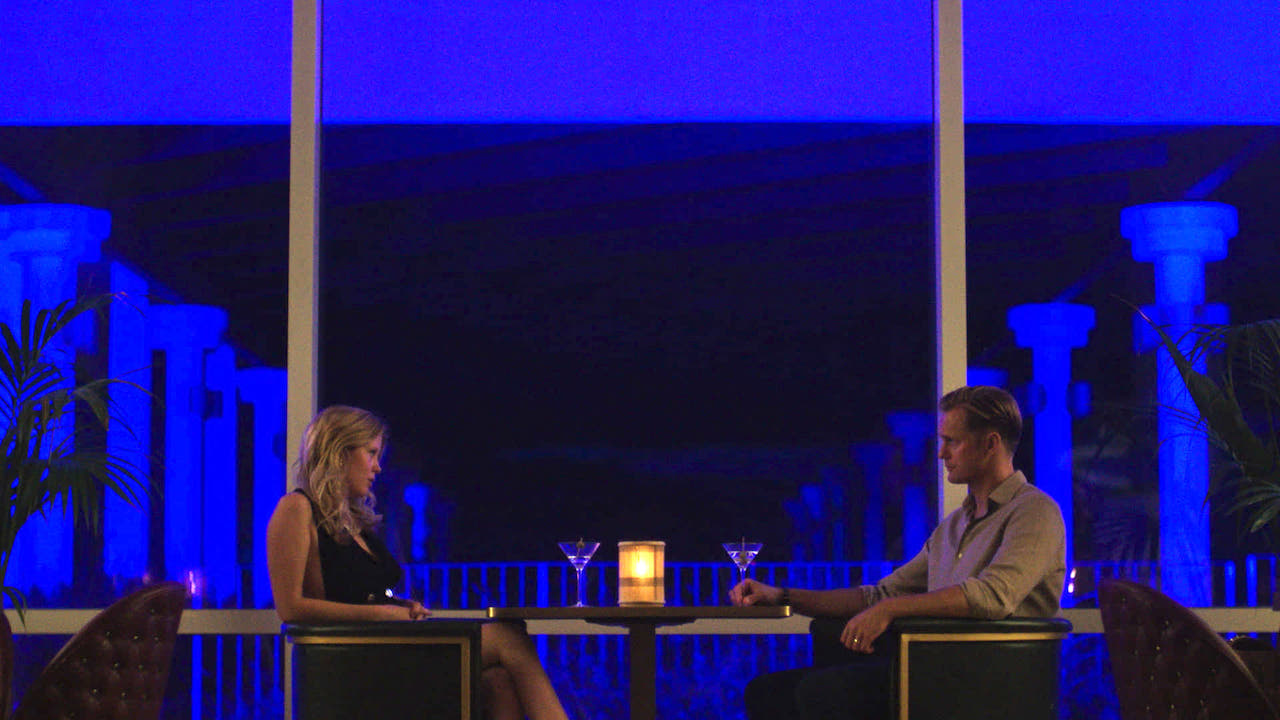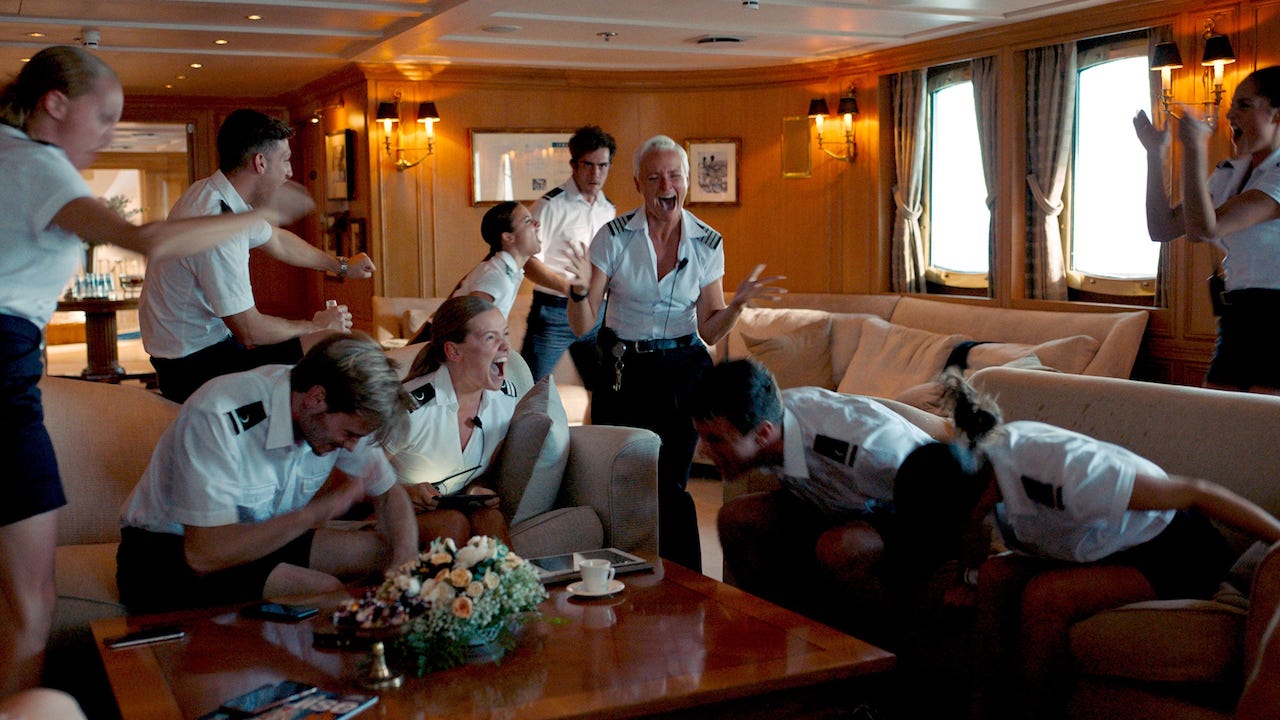Infinity Pool and the burgeoning genre of ‘eat the rich’ satire

Brandon Cronenberg’s “elites on vacay” thriller is just the latest chapter in a hot filmmaking trend of roasting upper-class privilege. Here’s Luke Buckmaster on Infinity Pool, The White Lotus, and more.
Infinity Pool
What do rich bozos do for shits and giggles? This evergreen question underpins many films and TV shows that examine decadent follies of the uber-elite—often arriving at rather bleak conclusions about capitalistic tendencies and the human condition. A new entry to the genre is writer/director Brandon Cronenberg’s Infinity Pool, which is based on a fictitious island where wealthy holidaying foreigners partake in the usual indulgences: fine dining, bonking, and killing the locals.
Author James Foster (Alexander Skarsgård) is experiencing a prolonged period of writer’s block, faffing about in luxury with his wife Em (Cleopatra Coleman). Another vacationer, Gabi (Mia Goth), approaches him, gushing about how much she loves his first and only book. Soon James and Em venture into the countryside for a day trip with Gabi and her husband Alban (Jalil Lespert), despite tourists being warned against leaving the resort. Things take a turn when a bleary-eyed and sozzled James commits a hit and run, killing a local.
Hauled in by the cops the next morning, the film becomes very…sci-fi when the police tell James the good news (of sorts). Instead of him being executed, as is custom on the island, the government has a special process to deal with such incidents: they’ll make an exact copy of him—the doppelganger even sharing all his memories—and kill the double instead. Cronenberg acknowledges the obvious question of how the replica can be distinguished from the original, but doesn’t get sidetracked. Instead he segues into gnarly class commentary about middle and upper-class boredom, via scenarios that wouldn’t look out of place in The Purge, Westworld or an Eli Roth movie.
If you thought The White Lotus presented a cynical portrait of cashed-up tourists—whoa, this film is like a poke in the eye with a sharp stick. Yet both productions belong to the bourgeoning “eat the rich” genre and perform broadly similar functions: skewering the privileged by peeling back the utopian facades of a paradise-like setting to reveal terrible, stinking realities.
The White Lotus is a great example of invisible satire: the class commentary is there, baked into its luxury hotel setting and stamped across every scene. But the show is so closely oriented to characters and circumstances you could watch both seasons and not see it. The subtext is a consequence of the drama—accessible for those who want to scratch away at these themes without having them up in floodlights.

In season one, the brattish Shane (Jake Lacy)—furious that he didn’t get a particular room for his honeymoon, and unwilling to let it go—will compel some viewers to think about entitlement and privilege. The show enters pricklier territory through the imbalanced power dynamic between hotel guest Tanya (Jennifer Coolidge) and masseuse Belinda (Natasha Rothwell), the latter at the beck and call of the former. Not just because Tanya is a guest, but because she offers to put up money to finance a business for her. As The Guardian’s Lucy Mangan wrote: “It’s probably not a consciously manipulative move by Tanya to use her money to tie Belinda to her and yet—what do we call it when someone is bonded to another and not free to come and go as they wish?
Other recent films (among them Infinity Pool) use lavish locations for more explosive messaging. In The Menu, diners with very deep pockets pay to visit an ultra exclusive restaurant managed by the tyrannical Chef Slowik (Ralph Fiennes), who makes the Soup Nazi look like a saint. Slowik has a very particular plan to punish his well-heeled clientele, the film’s second half erupting in Grand Guignol spectacle. It’s enjoyable but the targets are vague…what is this film saying about foodie culture? In Triangle of Sadness, wealthy elites live it up on a luxury yacht. But Mother Nature doesn’t respect social hierarchies, and spectacularly upsets their plans—triggering a repulsively entertaining 15 minute vomiting scene that single-handedly bestows upon the film a legendary status.

Bong Joon-ho’s great thriller Parasite is another recent and famous class commentary, pivoting around two families: one slum-dwelling destitutes and the other affluents in an ultra chic modern abode. Family is also central to Ready or Not, in which the snobby uber-rich Le Domases try to kill an innocent woman (Samara Weaving) who marries into the family, only to find herself part of a ritualistic sacrifice (standard in-law stuff). An early flashback scene features freaky masks, and masks are also part of the hugely popular series Squid Game—worn by billionaires who gamble on death tournaments populated by poor players.
As you can see, the “eat the rich” genre is flourishing at the moment—that label of course encompassing stories in which the rich do the (proverbial) eating. That’s certainly the case with Infinity Pool. It’s a bitter pill to swallow, venting into very ugly and unsettling territory, explored by Cronenberg with a chilling kind of detachment. But, of course, this kind of narrative rarely ends well. Hollywood loves happy endings—but even the schmaltziest screenwriters would struggle to turn uncurbed privilege and gross inequality into feel-good fare.


















